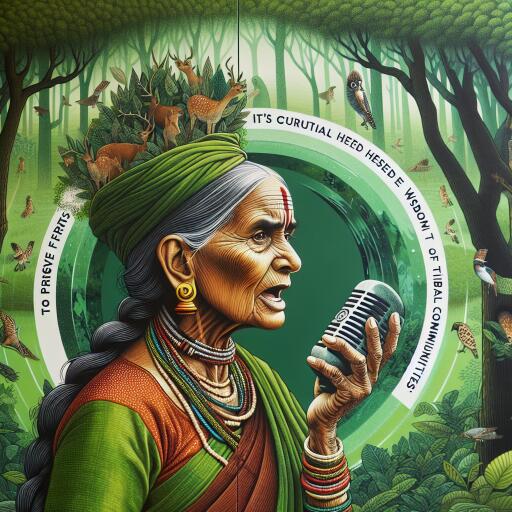
Droupadi Murmu on ecology: To preserve forests, it’s important to listen to tribal communities
In a profound message that resonates with the imperative of ecological conservation, recent statements have highlighted a crucial aspect often overlooked in the discourse on environmental sustainability: the wisdom of tribal communities and their intrinsic relationship with forests. This insight came to the forefront during a significant convocation ceremony for new officers of the Indian Forest Service, underscoring the symbiotic relationship between traditional knowledge and modern conservation efforts.
It’s no secret that forests play a pivotal role in sustaining life on Earth, not merely as repositories of biodiversity but as essential actors in the global climate system and as providers of resources and refuge for countless species, including humans. However, the prevailing narratives often forget that to truly protect these vital ecosystems, one must turn to those who have lived in harmony with them for centuries: the tribal communities.
The echo of this sentiment was felt strongly during the address, where it was emphasized that our era, marked by rapid development and technological advancement, has also been witness to environmental degradation and climate change. This duality calls for a reevaluation of how we view and interact with our natural environment. The notion that we are mere trustees of the earth’s resources, rather than their owners, invites a humbler, more responsible approach to environmental stewardship.
Bringing to light the sacrifices of officers who have laid down their lives in the service of environmental conservation, the speech underscored the valor and dedication required to protect our natural heritage. It served as a poignant reminder of the multidimensional challenges faced by forest officers, from combating illegal logging to preserving biodiversity, all while navigating the complex interplay between conservation and development.
The urgency of climate change and the rapid loss of forest resources globally necessitate a reevaluation of traditional forestry education. Incorporating advanced methods such as the Miyawaki technique for afforestation and leveraging artificial intelligence to identify and manage suitable areas for tree planting are among the innovations suggested to adapt to the rapidly changing environmental landscape. However, the fusion of tradition and modernity remains a central theme, suggesting that while technological solutions hold great promise, they must be employed in a manner that respects and integrates the timeless wisdom of traditional forest management practices.
The narrative refocused on the invaluable insights that tribal communities offer, grounded in centuries of living in close communion with nature. Their sustainable lifestyle practices, often sidelined in the rush towards modernization, hold lessons in ecological balance and conservation that are more pertinent today than ever. The call to not only learn from but also ensure the active participation of tribal communities in conservation efforts highlights a move towards more inclusive, holistic environmental governance.
Reflecting on the historical context in which the management of forests was shaped by colonial objectives rather than ecological sustainability, the discourse suggests a renewed commitment to decolonizing forest conservation. This implies a shift from exploitative practices towards a model that honors the rights and wisdom of indigenous populations, ensuring that forest management becomes a vehicle for social justice as much as environmental protection.
Addressing the new cadre of forest officers, the speech conveyed the immense responsibility that rests on their shoulders. They are tasked not only with conserving India’s rich natural resources but doing so in a manner that respects constitutional values and promotes the wellbeing of all citizens, especially those for whom forests are home.
In conclusion, the keynote speech at the Indian Forest Service convocation ceremony was more than a passing of the baton to a new generation of conservationists. It was a compelling call to action for a paradigm shift in how we approach the stewardship of our natural resources. By weaving together the threads of tradition, modernity, and the invaluable knowledge of tribal communities, we can foster a more resilient, sustainable approach to forest conservation that honors both our ecological and cultural heritage.





Leave a Reply